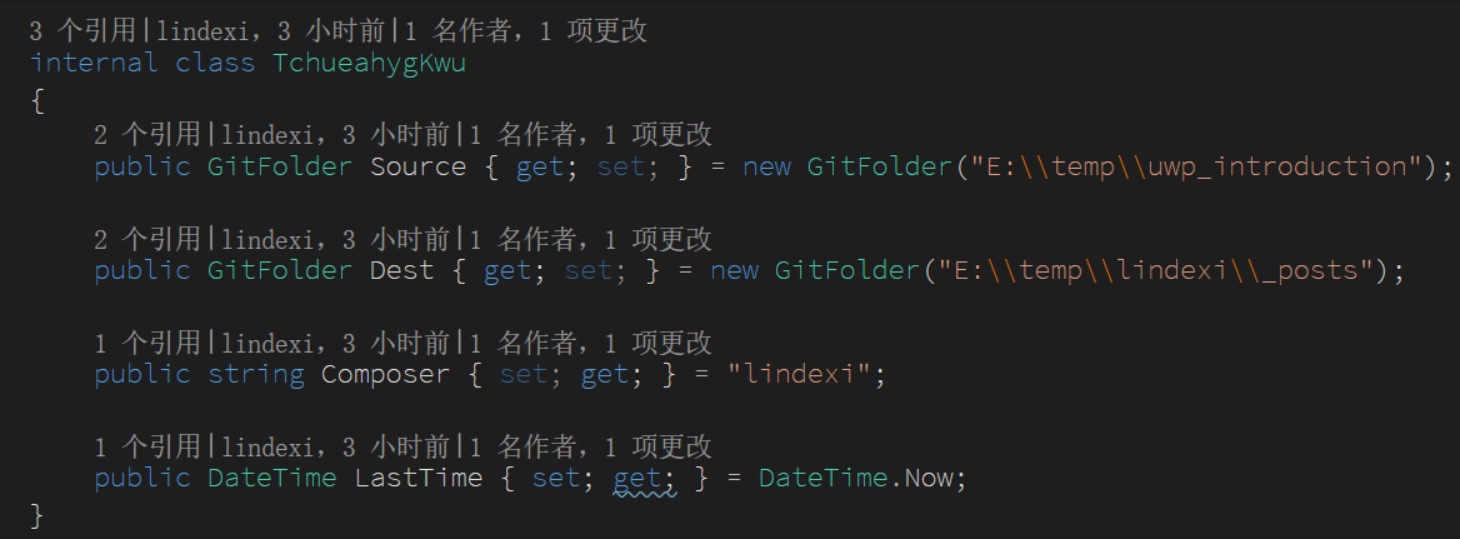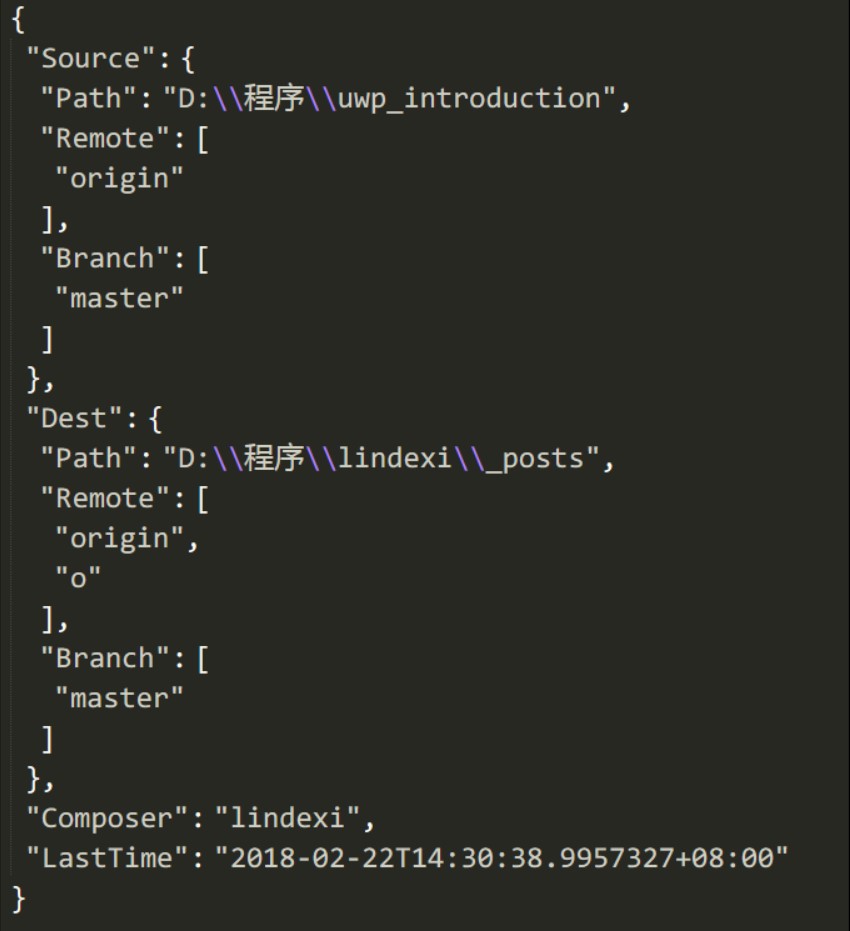本文讲的是关于在uwp使用json的简单使用,json应用很多,因为我只是写简单使用,说的东西可能不对或者不符合每个人的预期。如果觉得我有讲的不对的,就多多包含,或者直接关掉这篇文章,但是请勿生气或者发怒吐槽,可以在我博客评论 http://blog.csdn.net/lindexi_gd
现在很多应用都是使用json
如果我们拿到一段json,想要把它变为我们C艹艹可以用的,我们需要先对json的类进行转换,其实很简单,我们在复制一段json
不需要我们对这json转换为类,如果需要手动写很容易写错。因为我们有vs,在我们的编辑,可以看到粘贴为类,这个功能在 VisualStudio 2017 是没有的,需要安装插件。
我们复制完一段json,然后点击粘贴,就好了,自动生成对应的类,不过类的命名有些奇怪。
如果我们拿到一段json,请看下面
{
"results":
[
{
"location":
{
"id": "WX4FBXXFKE4F",
"name": "北京",
"country": "CN",
"path": "北京,北京,中国",
"timezone": "Asia/Shanghai",
"timezone_offset": "+08:00"
},
"daily":
[
{
"date": "2015-09-20",
"text_day": "多云",
"code_day": "4",
"text_night": "晴",
"code_night": "0",
"high": "26",
"low": "17",
"precip": "0",
"wind_direction": "",
"wind_direction_degree": "255",
"wind_speed": "9.66",
"wind_scale": ""
},
{
"date": "2015-09-21",
"text_day": "晴",
"code_day": "0",
"text_night": "晴",
"code_night": "0",
"high": "27",
"low": "17",
"precip": "0",
"wind_direction": "",
"wind_direction_degree": "157",
"wind_speed": "17.7",
"wind_scale": "3"
},
"last_update": "2015-09-20T18:00:00+08:00"
}]
}
如果需要转换这个类,那么就需要在编辑让VisualStudio自动把 json 转类。
public class Thinw
{
public class Rootobject
{
public Result[] results { get; set; }
}
public class Result
{
public Location location { get; set; }
public Daily[] daily { get; set; }
public DateTime last_update { get; set; }
}
public class Location
{
public string id { get; set; }
public string name { get; set; }
public string country { get; set; }
public string path { get; set; }
public string timezone { get; set; }
public string timezone_offset { get; set; }
}
public class Daily
{
public string date { get; set; }
public string text_day { get; set; }
public string code_day { get; set; }
public string text_night { get; set; }
public string code_night { get; set; }
public string high { get; set; }
public string low { get; set; }
public string precip { get; set; }
public string wind_direction { get; set; }
public string wind_direction_degree { get; set; }
public string wind_speed { get; set; }
public string wind_scale { get; set; }
}
}
很快我们就得到了我们需要序列的类
接着我们使用Nuget安装一下插件
当然我还加上九幽的插件,九幽有几个插件可以获得我们应用数据,我们启动我们关闭,还有广告很好用
我们使用 Nuget 主要下载 Newtonsoft.Json ,这是一个很好用的、性能很高的序列化和反序列。
我们转序可以使用下面代码,实际上只是传入一个泛型而已,反序列的代码实际上可以一句话来写。
public void Unencoding(string str)
{
var json = JsonSerializer.Create();
Rootobject thinw = json.Deserialize<Rootobject>(new JsonTextReader(new StringReader(str)));
}
如果我们需要把我们的类转为json,这叫序列化,可以尝试使用下面的代码
var file = await ApplicationData.Current.LocalFolder.CreateFileAsync("data", CreationCollisionOption.ReplaceExisting);
using (TextWriter stream = new StreamWriter(await file.OpenStreamForWriteAsync()))
{
json.Serialize(stream, thinw);
}
这样把我们的类保存在文件,上面用到 UWP 文件读写。
如果觉得我做的简单,想要使用微软的Windows.Data.Json ,其实使用Newtosoft的才好
如果使用Windows.Data.Json,那么需要这样写
JsonArray root = JsonValue.Parse(jsonString).GetArray();
for (uint i = 0; i < root.Count; i++)
{
string name1 = root.GetObjectAt(i).GetNamedString("name");
string description1 = root.GetObjectAt(i).GetNamedString("description");
string link1 = root.GetObjectAt(i).GetNamedString("link");
string cat1 = root.GetObjectAt(i).GetNamedString("cat");
string image1 = root.GetObjectAt(i).GetNamedString("image");
var chan = new RootObject
{
name = name1,
cat = cat1,
description = description1,
image = image1,
link = link1
};
obs_channels.Add(chan);
}
如果属性多,基本上很多人会容易就打错,当然,可以先实例一个RootObject,然后使用新关键字,name去得到实例属性名称当然在我们使用Json会遇到一些属性我们不要的,那么如何json忽略属性,其实很简单,在Newtosoft可以在属性加[JsonIgnore],因为这些比较乱,所以也不打算在这里说。
首先是我们的类,任意的定义
public class Thine
{
public string Property{set;get;}
public string Ignore{set;get;}
}
我们要把Property包含,但是不包含Ignore,简单的代码是添加JsonIgnore告诉序列化不要序列化这个属性。
public class Thine
{
public string Property{set;get;}
[JsonIgnore]
public string Ignore{set;get;}
}
但是有时候我们要包含很少,基本都是不包含的,那么如何只用包含,其实我们可以在类加[JsonObject(MemberSerialization.OptIn)]看到了OptIn,其实OptOut就是不包含一些,OptIn就是包含一些
[JsonObject(MemberSerialization.OptIn)]
public class Thine
{
[JsonProperty]
public string Property{set;get;}
public string Ignore{set;get;}
}
在反序列化时需要注意,不是所有的类都可以反序列化,必须类的属性最后都是基础类型,必须类有默认构造函数没有参数。所以 StorageFile 等就是无法反序列化的,需要使用这篇文章的方法保存用户选择的文件。
序列枚举
例如有一个枚举
public enum Foo
{
lindexi,
jiuyou,
oschina,
mslaji,
yam,
}
进行序列,可以使用下面代码
List<Foo> foo=new List<Foo>()
{
Foo.lindexi,
Foo.oschina
};
string str = JsonConvert.SerializeObject(foo);
结果是
[0,2]
如果对上面的进行反序列会出现和原先一样的结果
但是如果尝试使用其他的枚举,不会出现错误,枚举的数量比原先多的一般就不会出现
var t = JsonConvert.DeserializeObject<List<KeyboardNavigationMode>>(str);
原来的是 Foo ,现在改为 KeyboardNavigationMode 结果还是一样

如果是数值的,容易出现这个错误那么如何使用枚举的字符串?
在需要使用的枚举类添加 JsonConverter
[JsonConverter(typeof(StringEnumConverter))]
public enum Foo
{
lindexi,
jiuyou,
oschina,
mslaji,
yam,
}
得到结果
["lindexi","oschina"]
但是如果使用的枚举不是自己写的,如使用 Key 枚举,这个是ms写的,不可以在枚举加上,这时可以在属性加上
例如有个属性
List<Foo> foo = new List<Foo>()
{
Foo.lindexi,
Foo.oschina
};
可以在属性转换时用
string str = JsonConvert.SerializeObject(foo,new StringEnumConverter());
这样可以做到和上面一样的方法
如果需要转换中文 参见:http://www.cnblogs.com/DomoYao/p/Json.html
参见:http://blog.csdn.net/lovegonghui/article/details/50248455
换行输出
默认的 SerializeObject 输出的字符串是不换行的。例如我序列化了下面的类

结果拿到的数据是:

通过下面的代码就可以让 json 在转换的时候换行
var jsonSerializerSettings = new JsonSerializerSettings();
jsonSerializerSettings.Formatting = Formatting.Indented;
string str = JsonConvert.SerializeObject(obj, jsonSerializerSettings);

本文会经常更新,请阅读原文: https://dotnet-campus.github.io//post/win10-uwp-json.html ,以避免陈旧错误知识的误导,同时有更好的阅读体验。
 本作品采用
知识共享署名-非商业性使用-相同方式共享 4.0 国际许可协议
进行许可。欢迎转载、使用、重新发布,但务必保留文章署名
lindexi
(包含链接:
https://dotnet-campus.github.io/
),不得用于商业目的,基于本文修改后的作品务必以相同的许可发布。如有任何疑问,请
与我联系
。
本作品采用
知识共享署名-非商业性使用-相同方式共享 4.0 国际许可协议
进行许可。欢迎转载、使用、重新发布,但务必保留文章署名
lindexi
(包含链接:
https://dotnet-campus.github.io/
),不得用于商业目的,基于本文修改后的作品务必以相同的许可发布。如有任何疑问,请
与我联系
。

